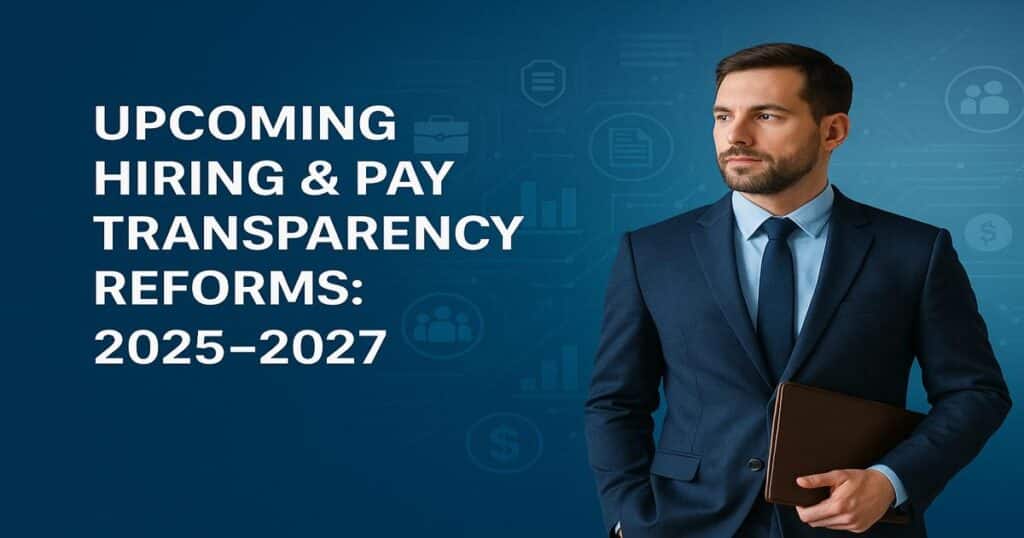Introduction

As hiring and pay transparency laws evolve across the country, employers face a growing list of compliance obligations. Between 2025 and 2027, multiple jurisdictions will enact reforms affecting criminal history screenings, pay transparency, and fair hiring practices.
At The Screening Source, LLC, we help employers stay informed and compliant with these changing regulations — ensuring that every hiring decision aligns with federal, state, and local requirements.
(This article is for informational purposes only and does not constitute legal advice. Employers should consult legal counsel for guidance specific to their organization.)
Criminal History Reform: Stronger Protections & Procedural Requirements
Philadelphia — “Ban the Box” Amendment (Effective January 6, 2026)
Philadelphia has expanded its Fair Criminal Record Screening Standards Ordinance with new limits on the use of criminal history:
- Only misdemeanor convictions within the past four years may be considered.
- Expunged or sealed records cannot be used, even if disclosed voluntarily.
- Before taking adverse action, employers must provide written notice including:
- A summary of rights,
- Instructions for providing rehabilitation evidence or disputing errors, and
- A 10-business-day response period.
- Retaliation within 90 days of an applicant asserting rights creates a presumption of violation.
Washington State — Fair Chance Act Revisions
Effective July 1, 2026 (large employers) | January 1, 2027 (small employers)
Key updates include:
- Background checks only after a conditional job offer.
- Arrests and juvenile records excluded from review.
- Employers must complete a written individualized assessment before any disqualification.
- Two-business-day response period for applicants.
- Protections now extend to current employees under disciplinary review.
California — Heightened Enforcement
While the California Fair Chance Act itself remains unchanged, the Civil Rights Department (CRD) is intensifying enforcement:
- Employers must perform and document reasonable individualized assessments.
- Under Labor Code §432.7, disciplinary actions based solely on arrests (without conviction) are prohibited.
Minneapolis — New Protected Class: “Justice-Impacted Status” (Effective August 1, 2025)
Minneapolis now recognizes “justice-impacted status” as a protected class — covering arrests, charges, convictions, probation, and incarceration.
- A six-factor individualized assessment is required.
- Blanket disqualifications are banned.
Pay Transparency & Salary History Restrictions
Massachusetts (Effective October 29, 2025)
- Salary ranges required in all job postings and promotions for employers with 25+ employees.
- Employers with 100+ employees must report demographic pay data.
- Penalties up to $25,000 per violation; a two-year grace period applies.
Cleveland, Ohio (Effective October 27, 2025)
- Employers with 15+ employees must disclose pay ranges and may not ask for salary history.
- Documentation must be retained for compliance.
- Fines up to $5,000, with a 90-day cure period.
Vermont (Effective July 1, 2025)
- Employers with 5+ employees must disclose good-faith salary ranges in all postings.
- Applies to remote workers located in Vermont.
Washington State (SB 5408 – Effective July 27, 2025)
- Employers have five business days to correct noncompliant postings.
- Fixed wages may be disclosed when appropriate.
- Employers are not liable for outdated third-party postings if corrected promptly.
- The Branson v. Washington Fine Wine & Spirits LLC decision broadens the definition of “applicant,” increasing exposure for inaccurate postings.
Delaware (Effective 2027)
- Employers with 26+ employees must disclose salary ranges and benefit descriptions in job postings.
- Applies to both Delaware-based and remote positions offered by Delaware employers.
Key Takeaways for Employers
As pay transparency and fair chance laws expand, compliance is no longer optional — it’s a competitive advantage. Employers who stay informed and proactive can avoid penalties, attract top talent, and demonstrate a commitment to fair, equitable hiring.
The Screening Source, LLC can help your organization implement compliant background screening and verification practices to align with these new regulations.
Learn more: Contact The Screening Source, LLC
